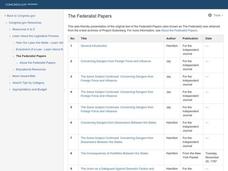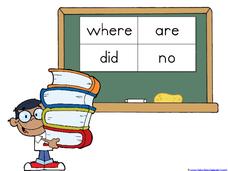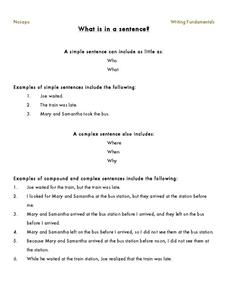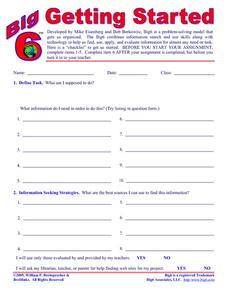Syracuse City School District
Summary of Fiction and Non-Fiction Text
Somebody Wanted But So Then (SWBST)? Yes! Here's a great strategy for teaching young readers how to summarize narrative text. In addition, the packet includes exercises that show kids how to summarize nonfiction text using the classic...
Newseum
Putting the Consumer's Questions to Work
Who, what, when, where, why, and how are good questions to ask when evaluating a source. First, scholars find two sources of information relating to a chosen topic. Next, pupils complete a worksheet to gauge the source's credibility....
Teaching Tolerance
Reflection: What’s Your FRAME?
Encourage your class to recognize the diversity in the beliefs and backgrounds of their peers. Learners use the acronym FRAME to consider culture, background, and life experiences.
Student Handouts
The Five W's and How
Here is a great graphic organizer for ensuring that young researchers and writers cover all their bases when brainstorming a topic by considering the five W's (who, what, where, when, and why) and how.
Worksheet Web
Interrogatives and Auxiliary Verbs
Interrogatives—who, what, where, when, why, and how—are the focus of a grammar worksheet that reinforces writing questions and using auxiliary verbs.
Dorling Kindersley
Question Words
Teaching your primary learners how to ask questions? Then look no further. This worksheet introduces the six essential question words: who, what, where, when, why, and how. Children begin by practicing how to write these words, before...
Common Sense Media
Oversharing: Think Before You Post
Could your learners use a little more discretion when they post online? Take a look at these ten rules of posting etiquette, which prompts them to be smart about what photos and information they share on the Internet.
K5 Learning
The Blind Men and the Elephant
Sometimes it's necessary to view the whole picture before making a judgment about a small part. Read a short story about five blind men who try to identify an elephant by feeling different parts and coming to their own conclusions....
Class Antics
Leap Year: Write a Newspaper Article
Extra! Extra! Read all about leap year! Here, scholars write a newspaper article all about leap year/leap day from given facts including who, what, where, when, and why.
Read Works
American Government Preamble to the United States Constitution
Observe Constitution Day with a activity that delves deep into the who, what, why, when, where, and how of the U.S. Constitution. Scholars read a short informational text then answer 10 questions—short answer and multiple choice.
Facing History and Ourselves
Life for German Youth in the 1930s: Education, Propaganda, Conformity, and Obedience
The German youth faced an onslaught of propaganda when they went to school, thanks to the Nazi regime led by Hitler during World War II. Pupils relate their education experiences to German youth by analyzing primary source readings,...
Nosapo
Family Titles, Pronouns, Writing about a Person
How is your grandmother related to you? How is your cousin related to your grandmother? Learn about family relationships and pronouns with an activity that guides pupils to write two short narratives about members of their families.
Mathematics Vision Project
Module 6: Congruence, Construction, and Proof
Trace the links between a variety of math concepts in this far-reaching unit. Ideas that seem very different on the outset (like the distance formula and rigid transformations) come together in very natural and logical ways. This unit...
Curated OER
Which Number Should I Call?
Who do you call if you spot someone littering? What if you see a fire? Who should you contact if the garbage truck does not arrive? Find out with a 13-question worksheet equipped with scenarios for scholars to read and decide which of...
Harper Collins
Amazing Women
Helen Keller became a teacher after her experience with Anne Sullivan, demonstrating to the world how valuable a dedicated mentor and determined spirit can be when overcoming adversity. Middle schoolers learn more about the influential...
K12 Reader
Natural Resources
What natural resources are available in your area? Your learners can consider this question after reading a brief passage about natural and renewable resources. After reading, class members respond to five questions related to the reading.
Teach-nology
Being a Comedian Isn’t All Laughs
What's it like to be a comedian? Find out with a short cloze passage about the life of a comedian. Kids use eight words at the bottom of the page to fill in the blanks throughout the passage.
1 plus 1 plus 1 equals 1
I Can Read! Sight Words Set #10
Focus on sight words with a series of worksheets for beginning readers. Kids can work on where, are, did, and no with matching games and tracing activities, and many more.
Nosapo
What Is in a Sentence, Paragraph, and Story?
Language arts is made up of many parts. Learners review the parts of a sentence, as well as how to make a simple sentence into a complex sentence, before examining full paragraphs and identifying the topic, body, and concluding sentence...
William P. Breitsprecher & Breitlinks
Getting Started
Set your pupils up for successful completion of projects with a six-step process to help with planning, time management, and reflection. Individuals fill out the first five sections of this handout before they begin their projects,...
Skills USA
Personal Growth and the Personal Leadership Inventory
What are employers looking for in prospective employees? Career-minded high schoolers examine their strongest technical skills as well as important 21st century skills, including leadership, empathy, clear communication, working well...
Mississippi Department of Archives and History
Protesting Violence without Violence
The ultimate legacy of Emmett Till's violent death is its role in the non-violent roots of the Civil Rights Movement. A lesson compares contemporaneous articles with the lyrics of Bob Dylan's "The Death of Emmett Till" and prompts...
Do2Learn
Sequencing Chart
Take note of events in a story with this organizer. Learners write down the who, what, where, and when, writing down four events in the order that they occur.
Mary Pope Osborne, Classroom Adventures Program
Dinosaurs Before Dark
Young readers travel back to the time of the dinosaurs in this literature unit based on the story Dinosaurs Before Dark. Intended for use with upper-elementary special education young scholars, this resource provides reading...
Other popular searches
- Who What When Where Why How
- Who What Where When Why
- Who, What, When, Where, Why
- Who What Where When
- Who What When Where Passages
- Who/when/what/where/why
- Who What When Where and How
- Who What When Where Worksheets
- Who What When Where and Why
- Who, What, When, Where and How

























